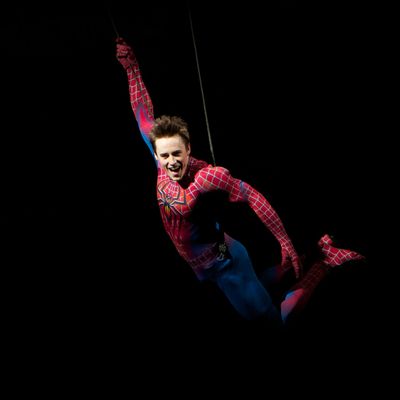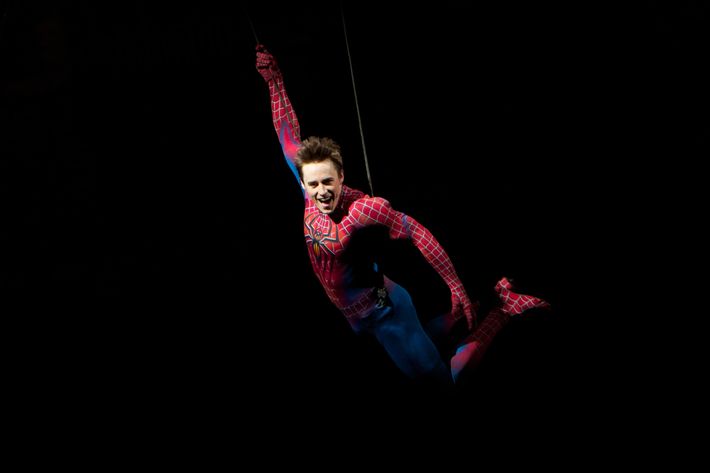

With any luck, this will be the last time you’ll run across Spider-Man: Turn Off the Dark in this space. I can’t say I’m sad to be through with it. The thrill is gone. So is the insanity and the walleyed, aneurysm-in-progress fun of it all. I’m sorry to report that the eight-legged, nine-lived megalomusical — which finally opened tonight, in its newly tamed, scared-straight and heavily Zolofted post-Taymor state — has deteriorated from mindblowingly misbegotten carnival-of-the-damned to merely embarrassing dud. Awash in a garbage-gyre of expository dialogue pumped in by script doctor/comic-book vet Roberto Aguirre-Sacasa, its lavish stage pictures turned to colloidal mush by director Philip William McKinley and choreographer Chase Brock, Spidey 2.0 is indeed leaner and more linear, and its story has been brutally clarified: It’s now all too clear how very, very little was there in the first place. Spider-Man violates the first rule of pop fantasy: Never lose the distinction between beautiful simplicity and rank simplemindedness.
On the plus side: The flying rigs work now. No hitches, no potential manslaughter charges. Hooray. But don’t worry, thrill-seekers: Every airborne actor still provides a fresh opportunity for you to fear for their lives, as well as your own. Spidey’s best trick — his habit of arresting an overhead swing at its apex and suddenly thunking down into the orchestra seats — remains intact.
But much of the show’s acromegalic Herman Munster charm, its faith in its own grotesque incoherence, its devotion to delusion, has been crudely lobotomized out of it, in order to make way for what studio executives often refer to as (barf) relationships. This means a lot of empty, brow-furrowed cliché-spouting, as couples come together and fall apart. Turn Off the Dark has trimmed its running time, but you’d never guess it, listening to Reeve Carney’s Peter Parker and Jennifer Damiano’s Mary Jane Watson prattle through their insipid pas de dumb. Carney, free of Taymor’s clutches and costume designs, now styles himself the Axe-scented club stud he resembles in “candid” photos. He’s got a strong, shreddy tenor and stage presence to spare, but newly empowered nerd he most certainly ain’t. There’s no wonder in him, no thrill-of-first-flight, just a cock-rock entitlement amplified by his new choreography, which most amounts to strutting and posing. Meanwhile, Taymor’s pet spider-goddess, Arachne (T.V. Carpio), has been reduced to some sort of vague, astral cheerleader figure.
In this absence of, well, everything that might constitute drama, Patrick Page’s Norman Osborn/Green Goblin has been handed the whole show. Pre-rehab, Page was the best thing about the musical; even the technical glitches, which could sometimes take upwards of ten minutes to repair, were made more than palatable by his natural showmanship, easy patter, and sly self-mockery. Now he’s been given scene after scene in which to cut up: The Goblin calls the Daily Bugle… and gets annoyed by one of those irritating voice-mail menus! You know the ones I mean? With the “press one for English,” “if you are satisfied with your message,” etc., etc.? What’s that? You do know them? You’ve known them since 1990? You don’t say! It’s the kind of stuff that wouldn’t make the cut on the Blue Collar Comedy Tour, but Spidey’s new handlers spread this soothing poop liberally, over everything, usually to cover the now-choppy set changes and splatter-pattern production numbers. (With no new money to spend, McKinley and Brock usually just clear the enormous stage and let cast members run amok in the void. The high-school musical rule of “everybody run this way! Okay, now, everybody run that way!” is very much in effect.)
No amount of mulch or manure can cover up the music, which is, by far, the show’s greatest weakness. (Which is saying something.) With Taymor in charge, Spider-Man essentially ignored its score, and invited us to ignore it, too. We happily obliged. Now, the inert echoplay of the Edge’s music and the dippy teen-poet vacuousness of Bono’s lyrics cannot and will not be denied. (From “And you say rise above / Into the skies above” to “All the weirdos in the world / are here right now in New York City,” there’s perhaps not a single defensible line — and Edge, in his wisdom, spaces those lines at arid rock distances, making you wait whole seconds for unimaginative rhymes most of us could Mad-Lib in an instant.) “Bullying by Numbers,” “DIY World,” “A Freak Like Me Needs Company,” and the narcotizing ballad “If the World Should End” (the undisputed nadir of last weekend’s Tony awards ceremony) demonstrate, beyond a doubt, that the boys from Dublin never had a damned clue what a musical was or how to dramatize action and emotion in song. Spider-Man was a bad Julie Taymor musical; it is now, wholeheartedly, a terrible U2 musical, with a governing dramaturgy that owes more to Pop than Achtung Baby.
Spider-Man — to beat my running metaphor into the ground and then leave it for dead — is like that good-and-crazy friend with a highly entertaining substance-abuse problem, the one who goes off and gets clean, and comes back a different and diminished person: With his manias and overmuchness reined in, you suddenly realize how very little you ever had to offer one another. With Taymor gone, and the ruins of her monstrous Lovecraftian vision overrun by Lilliputians, there’s simply nothing to see here, other than the sort of “stunt spectacular” that wouldn’t look out of place amid a backdrop of roller coasters and toddler vomit. It’s a vast emptiness, void even of its animating madness. It shuffles and smiles and subsides, like a good inmate, its hummingbird heartbeat slowed to a crawl. Put your head to Spidey’s chest, and all you’ll hear is the dull smack of a damp wad of cash hitting the boards.
Spider-Man: Turn Off the Dark is at the Foxwoods Theatre, 213 West 42nd Street.




